Zdenek Vasicek, a music teacher in Tisnov, shares his experiences of teaching CLIL in the Czech Republic.
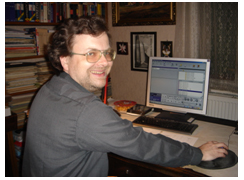 Zdenek Vasicek at home |
Tell us who you are and what you do.
I was born in Brno (Czech Republic, South Moravia region) in 1961. I graduated from the Academy of Performing Arts in Prague (Faculty of Music) in 1988 with an MgA in organ playing and an MgA in music theory. I then obtained a Ph.D. in musicology from Masaryk University in Brno (Faculty of Arts) in 2001 and a Ph.D. in music theory and music pedagogy from the University of Ostrava (Pedagogical Faculty) in 2008. For years I worked as music teacher and have investigated the CLIL concept with pauses since 1993. With different CLIL themes I participated actively at international conferences in Austria, the Czech Republic, Hungary and Switzerland. I have been a member of the (Czech) Association of German Language Scholars and Teachers of German and of the Czech Educational Research Association (CERA). I live in Tisnov, near Brno. Tisnov is a garden city with less than ten thousand inhabitants. I work here as music teacher at the local Primary Arts School (PAS) and have had enough peace for my work. I am mainly interested in music, languages, CLIL and educational research.
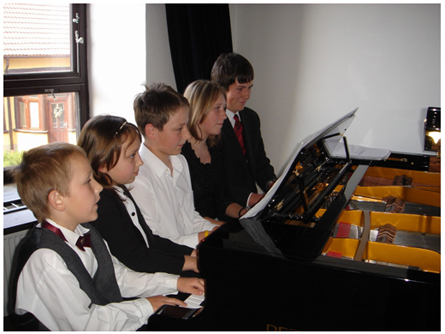 The Lavicka family or a ten-handed piano playing. |
What are your impressions of learning subjects through English as a foreign language?
I have taught piano playing and organ playing as CLIL with English or German communication language at PAS in Tisnov since 2000. The music lessons have been much more interesting both for the teacher and for the pupils. Some of my pupils have believed that the foreign language as a part of CLIL was an important, or even the most important, reason to continue here. To make it clear, the study at PAS is quite voluntary for the pupils! In 2000, the concept was not known enough yet and represented something “suspicious” for some of my colleagues. The headmaster of the PAS in Tisnov, Mgr. Jaromir Skara, has supported the CLIL idea from the beginning, therefore he merits a word of thanks. But I have been the sole CLIL teacher at this school all the time. This will remain the case until my younger colleagues feel the necessity of reinforcing their professional careers also in this way.
Can you give us an idea of how much CLIL goes on in schools in the Czech Republic generally?
|
I think that the Czech websites witness gradual implementing of CLIL at different schools. As far as CLIL at PAS is concerned: I myself as an external teacher at the Methodological Centre of the Janacek Academy of Music and Performing Arts in Brno (2004-2007) have taught CLIL to dozens of teachers from PAS in the Czech Republic and partly also in the Slovak Republic. The best participants could teach CLIL at their own schools. I have also written a university handbook for teachers and pupils beginning with piano playing as CLIL. The CLIL concept is relatively well known at Czech PAS today, but more as a general idea rather than a reality. I think that it will need some time to enforce and broaden this concept as a regular part of normal education.
What are the most important issues for teachers working in English-medium Education in your context?
It is necessary to master an appropriate vocabulary and grammar as a system and also as a summary of partial subsystems. And always according to the pupils' needs. The only way to do this is to practise CLIL day-by-day for a long time and to note findings to form 'summarized knowledge' or even a handbook.
Is your course through English a successful programme? What are the aspects of your subjects which make it a good one to study through a foreign language?
An average pupil's outcome in CLIL has been knowledge of several hundreds of lexical units of music vocabulary and easy communication, mainly in the present tense. It is not too much but it is better than nothing. From this point of view I could say: “Yes, my course has been a successful programme.”
Nevertheless, the potential of CLIL in music subjects is much larger than it may seem. For example, the pupils could master:
- Hundreds – or rather thousands – of lexical units concerning especially the doctrine of music and music theory;
- Bloom's taxonomy of educational objectives using the tabular organized complete families of parts of speech as helping aids;
- A handbook of verbally interpreted music containing the most frequently played compositions by composers representing many different music styles (= a handbook of music semiotics sui generis).
From this more advanced point of view I must say: “No, my course as a complete system is not a successful programme yet – it must become one later.”
The verbs are usually a very difficult problem in a foreign language. In teaching an instrument, playing it is possible with only the present tense for a very long time. The almost universally usable verb to play can be connected with a noun (the question What?) or with an adverb (the question How?). This solution could be called a 'basic English for teaching of any instrument playing as CLIL'. Higher levels of communication especially depend on the pupil's previous foreign language preparation and knowledge gained at general education schools. Reciprocal (teacher-versus-pupil and vice versa) foreign language communication (meaning a full-value communication) needs about a decade of such preparation.
Do you think this way of teaching is here to stay in your school, and in the Czech Republic, in Europe ... do you think it is likely to grow?
English will become the decisive language of globalized economics: for example, compare Marsh. That's why it is already the major foreign language in CLIL today! But the pupils should far-sightedly choose different languages to ensure their specific careers: for example, see Maalouf. These will surely be asserting themselves within CLIL. It is a real challenge for teachers – in the Czech Republic, in Europe and in the world. I myself understand it in this way and will continue with CLIL especially (but not only) in English. Slowly but surely. Step-by-step. Up to a (more or less) victorious end.
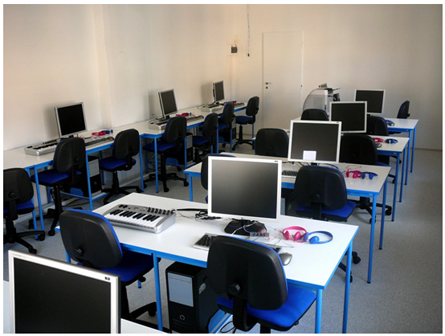 A new music classroom. (A heavy computerization for a new music and ITC generation.) |
Tell us a few words about impressions you get from parents about their children studying through the medium of English, what do they say about it?
Very often the parents are much more interested in CLIL than their children. If the father or mother works as an English teacher, they regard CLIL as an obvious way of study for their child.
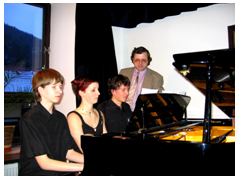 Zdenek Vasicek with his students. |
Would you recommend your school and this form of education to others? Would you be happy for your own children to study there?
I think I can recommend the CLIL concept in general and also the CLIL implementation in progress at our school to everybody. If I had my own children, I would send them to study every subject taught as CLIL. I myself and my contemporaries could not utilize this innovation when we were young. As late as my middle age I have chosen CLIL as a teacher. I am quite satisfied with CLIL at PAS in Tisnov today. And I can even versify it:
As a foreign language way,
The CLIL concept is OKAY!
References:
MAALOUF, A. et al.: A Rewarding Challenge: How the Multiplicity of Languages Could Strengthen Europe. Proposals from the Group of Intellectuals for Intercultural Dialogue set up at the initiative of the European Commission Brussels, 2008.
http://ec.europa.eu/education/policies/lang/doc/maalouf/report_en.pdf
MARSH, D.: English as medium of instruction in the new global linguistic order: Global characteristics, local consequences. UniCOM: University of Jyväskylä, 2006.
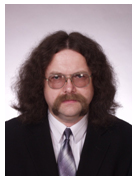
MgA. et MgA. Zdenek Vasicek, Ph. D. et Ph. D.
Topics
Your perspectives

Read about CLIL teachers' experiences around the world! Some of the letters provide an overview of the situation for CLIL teachers in individual countries, and some give a more detailed look at teaching.
- 1
- 2
- 3
- 4
- 5
- 6
- 7
- 8
- Currently reading
CLIL in the Czech Republic: Zdenek Vasicek
- 10
- 11
- 12
- 13
- 14
- 15
- 16
- 17
- 18
- 19
- 20
- 21
- 22
- 23


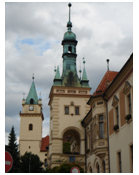

No comments yet